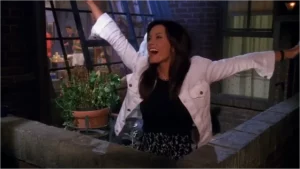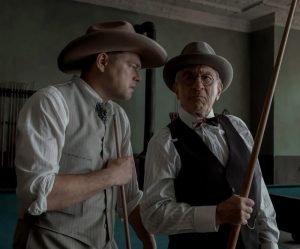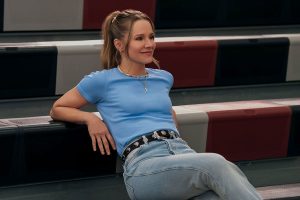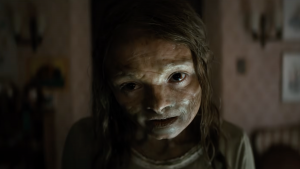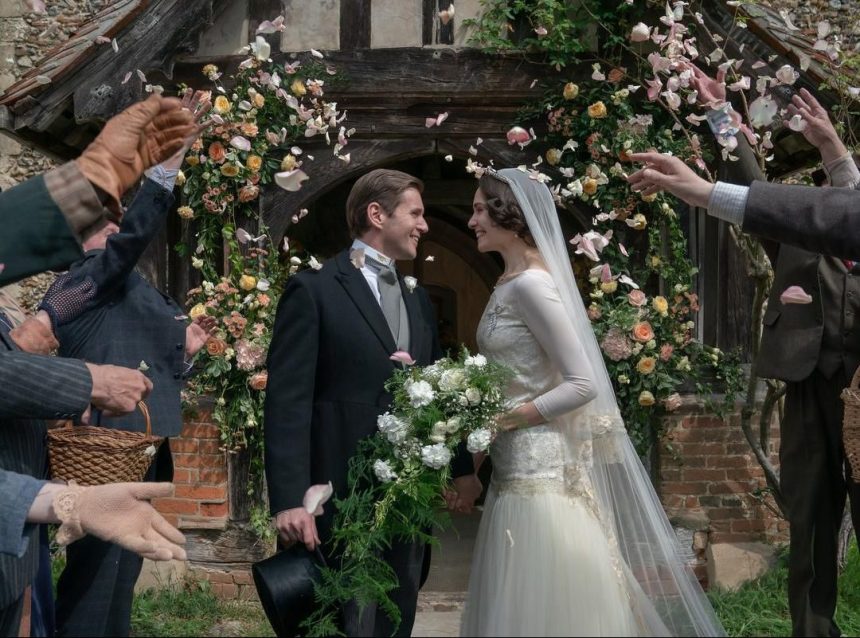
TO A NEW ERA, TO NEW BEGINNINGS,
AND TO OLD FAMILIARS!
You’ve been cordially invited for a royal visit” was the film tagline for 2019’s Downton Abbey, a theatrical motion picture continuation of the popular British drama Downton Abbey. Directed by Michael Engler, the film, which is set in 1927, depicts a royal visit to the Crawley’s family stately home in Yorkshire countryside, dealing with several pressing issues during the stay, including an assassin who plans to kill the monarch, servants who pitted against the royal entourage staff, and an inheritance discrepancy. Filled with lavished presentation and costume designs as well as an likeable cast (most of which returned to reprise their character roles), Downton Abbey received generally positive reviews from both critics and viewers alike; finding the continuation endeavor to be pleasing to longtime fans and distilling the right amount of the franchise ingredients into this cinematic presentation. The movie itself grossed roughly $194 million at the box office worldwide, which might not sound like much compared to other releases during 2019, but, given the fact that the movie’s production budget was somewhere between $13-20 million, it would seem that the feature came out on top by recouping its expenses and then some. Thus, with the reception that the movie was getting, the desire for a sequel is inevitable, with the Studios (along with Fellowes) shortly after the release of 2019’s Downton Abbey that a second installment was ordered. Now, after a few years since its initial release, it’s time to return to the “big house” and get reacquainted with the Crawley Family (and their colorful staff) in the sequel release of Downton Abbey: A New Era. Is this second chapter in the Downton brand worth seeing or does the whole “new era” narrative (and the series itself) run its course?
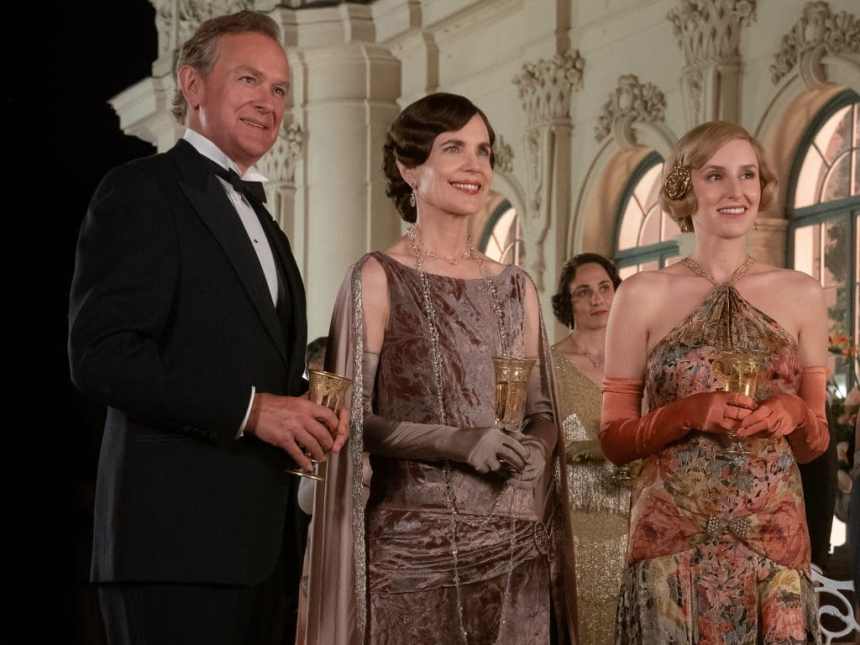
THE STORY
It’s the year 1929 and Downton Abbey still finds the Crawley family and its staff holding up residences at the opulent estate. Shaking up the status quo after a celebratory wedding, the Dowager Countess Violet (Maggie Smith) receives word that she’s inherited a villa in the south of France from a man she spend time with roughly seventy years ago. The family is shocked by the news, with the Dowager Countess refusing to elaborate further on the secret relationship. Invited to the villa by the invitation of the deceased man’s widow Madame Montmirail (Nathalie Baye) and his son…one Marquis de Montmirail (Jonathan Zaccai), Lord Robert (Hugh Bonneville), Lady Cora (Elizabeth McGovern), along with their daughter Edith Hexham (Laura Carmichael), her husband Bertie (Harry Hadden-Paton), Tom Branson (Allen Leech), his wife Lucy (Tuppence Middleton), and Lady Bagshaw (Imelda Staunton) as well as members of the Downton Abbey staff, including former head butler Carson (Jim Carter), who doesn’t trust the French. Enjoying the sights and the sounds of the location, Robert has to deal with the reasoning behind the gift of the luxury villa, keeping him uneasy around former owners. Back at Downton Abbey, Mary (Michelle Dockery), looking to improve the estate’s roofing, agrees to rent out the manor to a movie company, with director Jack Barber (Hugh Dancy) starting production on his latest silent film, starring Guy Dexter (Dominic West) and Myrna Dalgleish (Laura Haddock), leaving the staff, including Molesley (Kevin Doyle), and Daisy (Sophie McShera), starstruck as the shoot spins out of control, allow them to participate the production.

THE GOOD / THE BAD
Much like what I said during my review for 2019’s Downton Abbey, I’ll admit that I do love Downton Abbey TV series (and proud of it). What can I say…. I’m a sucker for costume period pieces (be it television shows or theatrical features films) and Downton Abbey is probably the best example of a costume period piece. Of course, I wasn’t immediately hooked on the show as I think I started watching it when the third season was being released that year, so I quickly got caught up the two previous seasons and instantly fell in love with the show. Yes, it’s not exactly the most “riveting” or original story to follow in television history, but Downton Abbey provides plenty of dramatic nuances within its characters as the show is rooted within its various multitude of characters and how their daily lives play a part with the “big house” of Downton…. whether that’s upstairs of people of note and of titles are pampered and deal with upper class issues or downstairs where maids and grooms scuttle about in the humdrum of life. 2019’s Downton Abbey was a somewhat “breath of fresh air” and an interest way for fans of the TV series to return to the characters (and drama) that the show was known for. Personally, I liked the 2019 film. Yes, it was still somewhat like an elongated Christmas episode (that each Downton Abbey season is known for doing), but it was joyous celebration that have a cinematic quality to the proceedings. Again, nothing different from what one would expect from a Downton Abbey, but it felt it was a welcome addition, with a royal visit to the “big house” that involves the entire cast of characters was fun and memorable to watch. Thus, the conclusion of 2019’s Downton Abbey was a great comfort watch of entertainment of British drama; fueling the returning interest of Crawley family (and their staff) for a new life on the big screen.
This, of course, brings me back to talking about Downton Abbey: A New Era, a 2022 period piece drama and the follow-up feature film to the 2019 movie. Much like what I said above, the success of the Downton Abbey movie provide that the public of fans wanted were still interested in the show, which (of course) prompted Fellowes (and Focus Features) to greenlight a sequel film shortly after. Like many Downton fans out there, I was quite excited by this news, especially since the upcoming project would once again be seeing in a cinematic motion picture format and even see a theatrical release both here (in the US) and broad. Furthermore, most (if not all) the cast would be returning to reprise their characters as well as bringing on several new ones for the sequel. After those pieces of tidbits, I didn’t hear much about Downton Abbey 2 for quite some time…. until the film’s movie trailer dropped and showcases plenty of new footage for the new film. All in all, it looked great and promised a new adventure for the Crawley family to work through in their British melodrama journey. Thus, I was quite excited to see the new Downton Abbey movie, which was now being called Downton Abbey: A New Era, when it was going to be released on December 22nd, 2021. Unfortunately, the feature was then pushed back several months twice, with a new release date being set for March 18th, 2022 and the finally setting along on firm date of May 20th, 2022 (in the US). So, I did have to wait a little longer than I was hoping for, but I did get to see the movie during its opening weekend. That being said, I had to push my review for the sequel back due to my work schedule and my back catalogue of film reviews. Now, I have some free time and ready to give my personal opinion on the Downton Abbey feature. And what did I think of it? Well, I liked it. Despite being a more overstuffed and less refined as the previous cinematic installment, Downton Abbey: A New Era still manages to be a pleasurable and emotionally endeavor that’s filled with generous details and heightened characters (both old and new) of the series. To me, it wasn’t as good as the first movie, but longtime fans of the franchise will enjoy this latest costumed period piece drama of the familiar British drama.
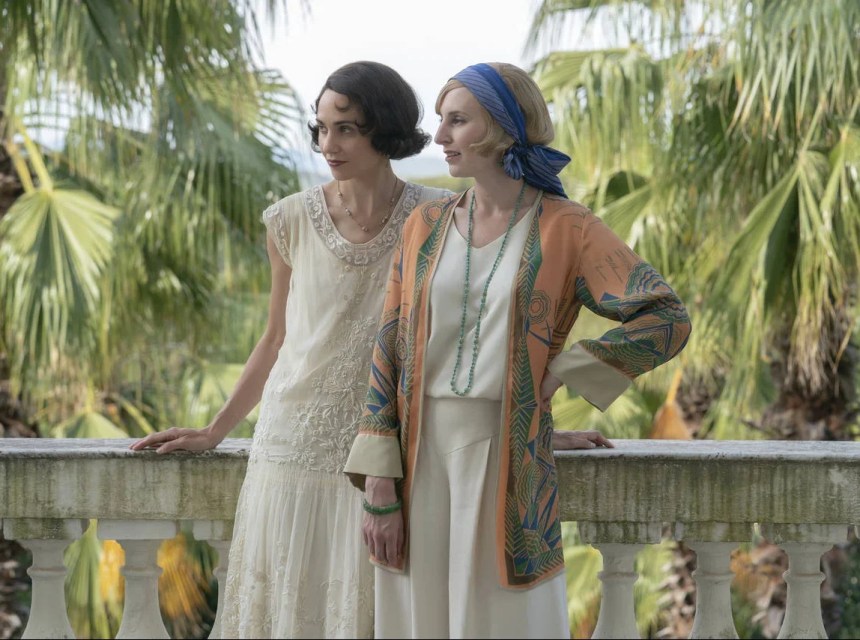
Downton Abbey: A New Era is directed by Simon Curtis, whose previous directorial works include The Art of Racing in the Rain, Women in Gold, and Goodbye Christopher Robin. Given the dramatic and emotional sentimentality that each of those films have produced within their production, Curtis seems like a perfect and suitable fit to helm a new motion picture for the Downton Abbey brand, which is already filled with aristocratic drama and lavishing emotions of both of “upstairs / downstairs” emotions. Despite, being a newcomer to the Downton brand, Curtis immediately feels like a great collaborator to the series; approaching the material with a sense of both familiarity to its namesake and broadening the series’ narrative with a few new nuances that help propel the story forward in a way that’s speak to its past as well as looking to new horizons. In this regard, Curtis definitely succeeds and matches both the drama and emotion that Crawley family saga has been known for emotional sentimentally and British period piece drama. I did like how Curtis decided to open up the movie by showcasing the wedding between Tom Branson and Lucy Smith; a sweet salvo introduction to the feature that quickly helps reconfirms that 2019 film’s last moments by showing a wedding of these two characters. Again, it’s a way to “reconnect” to what’s been presented before, with Curtis utilizing the scene with softness and Downton Abbey sweet before he begins to tell the main bulk of A New Era’s narrative. While there are some problems with how Curtis handles the juggling of the two story narrative lines in the film (more on that below), Curtis still manages to display a good dose of drama (both story and character) within the feature, incorporating the customary “Downton Abbey” flair, yet also make it his own by bringing a few new tricks, techniques, and directing style to make the project a tad different…..something that is befitting the feature’s namesake (i.e. A New Era). There’s still plenty to see and do throughout the entire movie that, while hitting a few pacing snags and overstuff bits, never feels dull or boring, with Curtis driving silly Britsh humor (and dry dialogue) scenes that definitely work as well as interjecting the notion of the emotional moments in a tender and heartfelt way. Thus, as to be expected, Curtis makes Downton Abbey have that “comfort watch” feeling; looking at the feature with such familiarity that it doesn’t color outside that much to be drastically different, but something many will come to expect, with a few new twists. In the end, whether good or bad, Curtis made his mark on the franchise, with A New Era celebrating the TV series brand with enough emotion, drama, and lavishing upper class flair to make the feature’s existence worthwhile, especially for longtime Downton Abbey fans, as well as continuing the saga of the Crawley family in a well-mannered and “comfort watch” viewing experience of costumed historical theatrics.
Much like the series and the previous motion picture, A New Era’s script was penned by Downton Abbey creator Julian Fellowes, who masterful weaves yet another iconic costume period piece drama for the story plot of the film; one that speaks to the franchise as well as for the feature’s one personal identity. Fans of the series will be pleased with what Fellowes has produced for the sequel; offering up a delightful and rich story that’s brimming those classic (almost fan-favorite aspects) of the series, which is a mixture of lighthearted moments with gravitas emotional weight. In a nutshell, the Downton Abbey series (as whole), including the movies, has always treated a great display of sentimentally without feeling too campy and / or too soapy. Fellowes’s contribution in A New Era feels like a “return to Downton Abbey” fanfare by promising all the correct prose, cues, and nuances one would expect from endeavor like this. Plus, adding new wrinkles into the standard Downton Abbey layer narrative such as the Dowager’s secretive past and Jack Barber’s directing talents while filming at the Crawley family manor showcase that the overall arcing narrative is moving forward, while still keeping up the tradition of what fans and viewers are looking. Thus, as mentioned above, A New Era is sort like a “comfort watch” that easy to digest and does (for the most part) leave a satisfying viewing experience.
As to be expected, the presentation of A New Era is absolutely stunning to behold throughout the entire feature, with picturesque details capturing both the wondrous British countryside where the Crawley’s family manor resides (and all the nearby vicinities) as well as French Rivera; a new location for both the movie and for the Downton Abbey movie world. Naturally, the upper class glitz and glamour of this particular era has played as a major player in the series and does so again with this sequel motion picture: finding the background visual aesthetics to be almost like a character for the movie. Thus, the film’s main “behind the scenes” team and collaborators, including Ellena Bleathman (art direction), Donal Woods (production design), Linda Wilson (set decorations), Maja Meschede and Anna Robbins (costume designs), and entire hair / make-up, for making their efforts while working on A New Era amazing and help bring the film’s visual world to life once again, with such detail, vibrancy, and lushness. Additionally, the movie’s cinematography work by Andrew Dunn is great and adds plenty of slick viewing angles and camera lightening to make the feature’s cinematics looks both lovely and appealing in enriching the feature’s experience. Lastly, the film’s score, which was composed by John Lunn, is terrific all the way around. Not only is he the main composer who scored the music for the TV series, but for also the previous Downton Abbey movie. Thus, Lunn’s contribution to the franchise has always been fantastic and does so again, with his contribution to A New Era compliment his past work by presenting a sweet and melodic score that certain resonates in every scene that is required. Overall, a beautiful soundtrack score from Lunn…. all the way around.
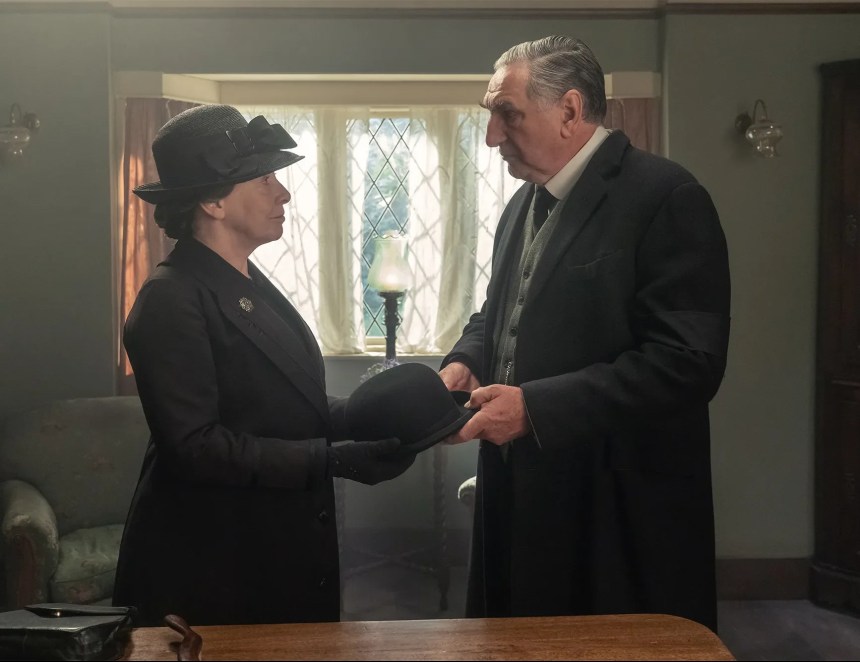
Unfortunately, A New Era does have its share of wrinkles within its execution make-up / undertaking, with the movie having a bit of problematic areas…. both inherent to the Downton Abbey namesake and to this particular film. In the former category, the feature has the same type of criticism that I would say that the 2019 theatrical motion picture, which breeds a lot of familiarity and formulaic nature to the proceedings. Like other similar ideas of movies being a continuation / follow-up to popular TV shows (i.e. Sex and the City, Entourage, Deadwood, etc.), Downton Abbey is purely made for fans of the series and not so much with the causal moviegoers. Of course, the movie is quite easy to digest and is somewhat simplistic to figure out (i.e. no head scratchers or sudden unexplained twists), but, like the 2019 film, A New Era jumps write into the thick of the story and quickly reintroduces the characters (both major and minor), with the exception of a few minor callbacks within dialogue scenes between characters. Thus, as I mentioned before during my review for 2019’s Downton Abbey film, this sequel feature is more limited to people who’ve seeing the TV series and not much the people who walk into the film with little to no prior knowledge of the show. To me, it didn’t bother me, but (as I said), A New Era is mostly for the fans of the series; acting more as a companion feature to its television predecessor rather than a standalone endeavor.
Perhaps the big difference point of criticism that I found while watching A New Era is how crammed and overstuffed the narrative is throughout the entire film. What do I mean? Well, there is a lot to tackle in this movie or for that matter…. the idea of translating a Downton Abbey story into a standard two-hour motion picture runtime, with so many characters and personal story arcs for them to accomplish in the plot. The 2019 Downton Abbey was able to prove this point and cultivated into a manageable story for the various characters (both major and minor) to play around in and did have a focus on the main plot at hand (i.e. the royal visit) and how the various people there deal with that ceremonial arrival. A New Era, however, has a messy undertaking that isn’t quite as polished or refined as the previous film was. While 2019’s Downton Abbey’s royal visit was the main subject matter of the picture, the sequel project focuses on two…..one being Violet’s past and her mysterious inheritance of a villa in the south of France, while the other focuses on a movie being filmed at Downton Abbey and the proses and cons of filming at the stately manor. The problem? Well, there’s just to way too much narrative plot to cram into a normal structure of a motion picture endeavor. This causes the jumbling of characters on the various main story threads to not do much and makes them feel either shallow or just simply underdeveloped with little amount of presence in the film than to just simply be there. This also causes problems for the film’s new characters, with a few getting a certain amount of time in the spotlight to shine, while others feel incomplete and thinking that most of there story arc ended up on the cutting room floor. Thus, the disjointed feeling of the two narratives feels rushed through the second half and almost like Fellowes is trying cram into a whole season in A New Era. Yet, this ultimately makes the project feel so overstuff that nothing really pans out in a fully-realized way; causing the movie to have that “too many cooks in the kitchen” syndrome when examining all the story / character narrative threads Even the film’s conclusion (climatic parts of the third act) fells a bit hastily done as Fellowes tries to wrap everything up in the story. Naturally, this causes the feature loose its momentum slightly as well as getting lost within its undertaking; shortening several characters and their arcs to make way for more prominent ones.
Of this category, Curtis also falls prey to this particular criticism, with the director having a little bit of difficult of trying to tackle all the various Downton Abbey character in two different settings. Unlike 2019’s Downton Abbey director Michael Engler, who had previously worked on the TV series, Curtis, while finding a certain natural rhythm and mantra for the dramatic emotional flair and flavoring of the brand, can’t seem to project the right amount balanced connection in managing the vastness of what Downton Abbey as to offer. This, of course, comes across in A New Era feeling a tad overreaching its own ambition, with the motion picture project have too much to say and to explore within the confines of a theatrical feature film endeavor, with too many plots and characters to fully realize them all in a satisfying manner. This, along with a few other notable concerns such as formulaic predictability, pacing issues, and a rushed ending, makes Curtis’s helming this Downton Abbey project a little bit worrisome, which makes A New Era not quite as polished as Engler did with the 2019 film. All in all, most of these problems didn’t completely distract from my personal viewing experience of the movie itself, but, comparing the two Downton Abbey movies side-by-side….I would say that the 2019 one is better than A New Era.
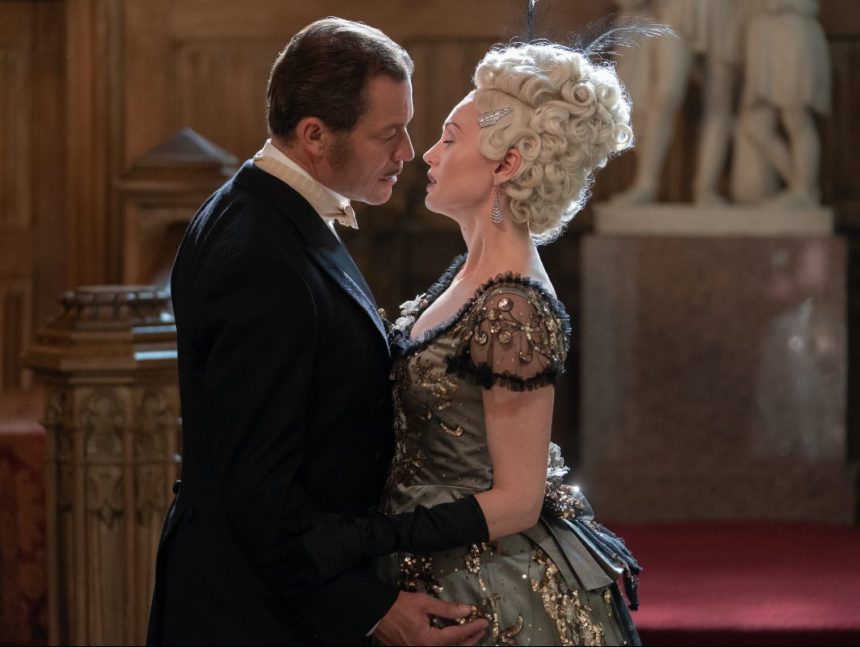
What definitely made the show was sprawling various characters that populate Downton Abbey, with all the acting talents playing those respective characters in fun and multi-façade way. So, as one could except, the A New Era movie excels in this department with most of the actors and actresses from the series returning to reprise their roles once as well as bring one several new ones for the new feature. However, much like what I said above, the characters themselves, while still fun, enjoyable, and entertaining with all their Downton Abbey personas and quirks still intact, are overstuffed with so many players in the movie that it becomes a struggle for Curtis (and script) to manage them all accordingly. Thus, many, including fan-favorites become secondary characters and are merely there for participation of continuity reasons. I sort of knew that this was going to be the cases, especially since this is the second Downton Abbey movie, but was still slightly disappointed by how overstuff the film is with its characters, including some that had good backstories / obstacles to tackle in A New Era. Much like entire series and the last film, actress Michelle Dockery (Non-Stop and The Gentlemen) returns to playing the center stage character of Lady Mary and continues to be prominent figure for most of the narrative. Like before, the character gets entangled in several of the big challenges and issues happen around the “big house” and gives Mary the most screen-time for her character to fully develop, with a more well-rounded arc. Plus, Dockery knows the character quite well and is up to the task of making sure that she (as Lady Mary) makes the most of it, which is a good thing.
Behind the main grouping, actor Hugh Bonneville (Paddington and Notting Hill) and actress Elizabeth McGovern (Ordinary People and The House of Mirth) fill in their series roles quite nicely as Robert and Cora…. Lord and Lady Grantham of Downton Abbey. Perhaps the only downside is the fact that the movie presents both characters (Robert and Cora) with individual particular sub-plots to follow, with concerns of Lord Grantham parentage and the mysterious arrangement that his mother had with the previous owner of the French villa and Lady Grantham over health issues. Both are clearly defined in the film, yet none of it really amounts to much because the narrative gets sidetracked by it; feeling a bit limp in how its presented and with not a whole lot of time to fully digest such sub-plot material. Still, for their parts, Bonneville and McGovern are still solid in their respective roles as Downton Abbey husband and wife. Additionally, the same can be said with actress Laura Carmichael (The Spanish Princess and Marcella), who plays Mary’s sister / Robert and Cora’s second daughter Lady Edith. Like Bonneville and McGovern, there is evidence to justify a few of her story arc beats in a few moments, but she ultimately starts to blend into the background as if the writers couldn’t produce anything. Then again, the character of Edith has pretty much come “full circle” following the conclusion of both the TV series and the last movie. Thus, I wasn’t really disappointed that Edith’s narrative in A New Era was kind of weak, yet it was still good to see Carmichael in the movie…. as a bit more bit more liver and happier Edith than previous times.
Unlike the previous Downton Abbey movie, A New Era pushes aside the character of Tom Branson aside for most of the feature. Of course, the character still participates in the movie’s story and appears throughout many scenes in the film, but he doesn’t have a large focal point like he did in the TV series or in the 2019 film. That being said, actor Allen Leech (The Imitation Game and Bohemian Rhapsody) still gives a solid performance as Branson. Similarly, actresses Tuppence Middleton (War & Peace and Dickensian) and Imelda Staunton (Harry Potter and the Order of the Phoenix and Nanny McPhee) as Lucy Branson (Tom’s wife now in the Downton Abbey world) and Maud Bagshaw don’t have much to do in A New Era and are merely there for a few scenes to add continuity. As much like the cast, their place in the film is a welcomed one, yet it’s sad that these two don’t get much dialogue / scenes in the sequel as they did make a great “first impression” in the previous feature. I just wished these three characters had a bit more to do (and offer) in the film. Also, actor Robert James-Collier’s (The Ritual and Coronation Street) as head butler Thomas Barrow has always been painted as the conniving individual character, who hates pretty much everyone. However, the first Downton Abbey movie portrays Barrow in a slightly different light by casting him in a less hostile / sympathetic light, especially since most of the “downstairs” staff are paired up together as he (as an individual) is looking for love. Much like before, A New Era shines the light on Barrow’s romance, while not as strong as the previous motion picture, yet still manages to have endearing spirt, who seems to have a special connection with one of the stars that come to Downton. Plus, as before, James-Collier does an excellent job in the movie.
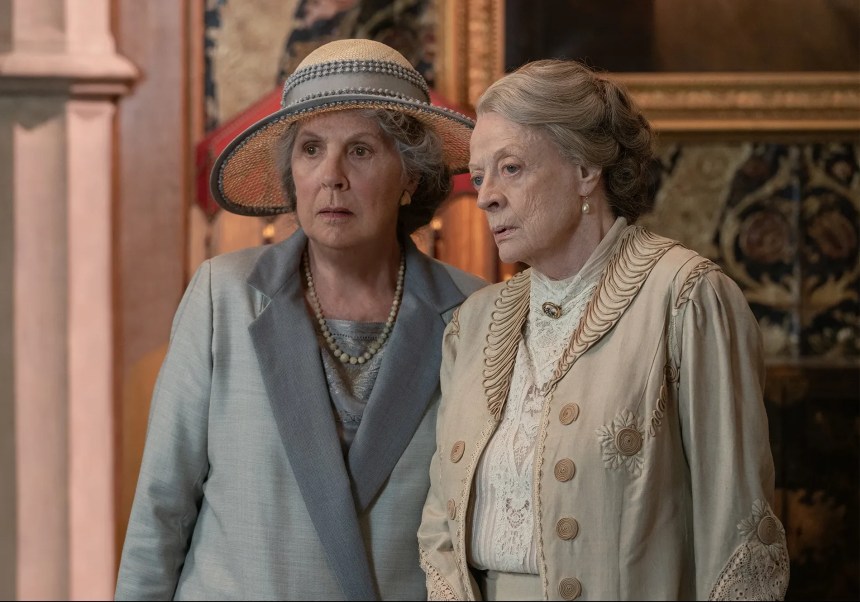
Of course, fan favorites are still present in the Downton Abbey movie, especially the character of Violet Crawley, the Dowager Countess of Grantham, who is once again skillfully played by actress Dame Maggie Smith. Known for her roles in Gosford Park, Ladies in Lavender, and The Secret Garden, Smith has always been a terrific “old school” British actress as seeing in all of her previous works, including her performance as Violet. Her tactful wit, sharp tongue, and memorable one-liners are once again a pleasure to hear as Smith continues to excel in the role, which definitely could’ve been played in a different way (thankfully it wasn’t). Likewise, her conversation along with Cousin Isobel Crawley (now Isobel Merton), who is played by actress Penelope Wilton (The Best Exotic Marigold Hotel and Five Days) are just as wonderful and cheeky as they were in the show. Perhaps the only downside is that these two particular characters are limited (almost by design) in A New Era, which is a bit disheartening because Smith and Wilton are truly magnetic whenever they are paired together on-screen. Still, there continuity involvement in the film are such as important and fun to watch.
Also, I can’t forget the other two fan-favorites, with the characters of Mr. Carson (the former head butler of Downton Abbey) and Mrs. Hughes, the head household maid at Downton Abbey, returning for another round of fan-service. Of course, both actor Jim Carter (Shakespeare in Love and King Lear) and actress Phyllis Logan (Secrets & Lies and Another Time, Another Place) are terrific together and definitely seem like a tried and true “old married couple”. Again, their involvement in the movie is a more like window-dressing in A New Era, which is slightly disappointing, but, much like the previous motion picture entry, it provides plenty of continuity and nuances to help lively up similar parts of the feature
The rest of the Downton Abbey characters, including actor Brendan Coyle (Me Before You and Lark Rise to Candleford) as Mr. Bates, actress Joanne Froggatt (Angela Black and The Harrowing) as Anna Bates, actress Samantha Bond (GoldenEye and NCS Manhunt) as Robert’s sister Lady Rosamund, actor Harry Hadden-Paton (The Crown and Versailles) as Edith’s husband Bertie Pelham, Marquess of Hexham, actor Douglas Reith (The Queen and Dumbo) as Isobel’s husband Lord Merton, actress Sophie McShera (Cinderella and Galavant) as Daisy Mason, actress Lesley Nicol (Beecham House and Sarah & Duck) as Mrs. Patmore, actress Raquel Cassidy (Lead Balloons and The Worst Witch) as Miss Baxter, actor Michael Fox (Dunkirk and Family Affairs) as Andy, and actor Kevin Doyle (The Tudors and Happy Valley) as Mr. Molesley, are dedicated to rounding out the supporting veteran players of the feature. Of course, there parts might be a bit smaller than in the series, but all of them quickly capture their respective roles (quirks and personas) immediately and become memorable in the scenes that they are in.
A New Era shines a light a few newcomers that join the sprawling Downton Abbey cast for this particular movie, with actor Hugh Dancy (Confessions of a Shopaholic and Ella Enchanted) leading the charge of the new players in the film as silent film director Jack Barber. He does certainly get a good amount of screen-time, mostly due to the spilt narrative direction of the main story threads, and gets some decent amount of time to star opposite against Dockery’s Mary, with pairing bonding together during their time. Likewise, actor Dominic West (The Wire and 300) and actress Laura Haddock (Transformers: The Last Knight and Da Vinci’s Demons) give good character roles as leading silent movie talent stars Guy Dexter and Myrna Dalgleish. Both West and Haddock are great in their respective roles, and each is given a small story arc to make their involvement in A New Era impactful. Unfortunately, I felt the characters of Madame Montmirail and her son, Marquis de Montmirail (the family that owns the French villa that the Crawley family is to inherit from) are a bit underdeveloped in the movie. It’s not so much on the acting efforts made by actress Nathalie Baye (Catch Me If You Can and Laurence Anyways) and actor Jonathan Zacci (Robin Hood and The Bureau) , who perfectly fit their respective characters quite well, but more on so how they are written into the movie; presenting several key points in the narrative, yet never following through.
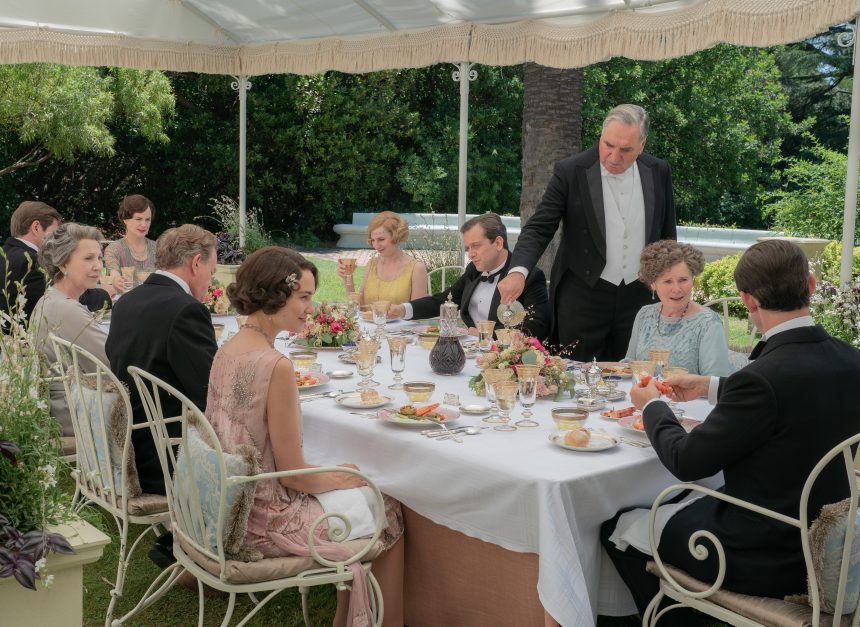
FINAL THOUGHTS
Receiving news of inheriting a villa in the south of France, the Crawley family uncovers more about the life of dear Violet’s past, while new challenges present themselves that will take the entire staff to deal back at home in the movie Downton Abbey: A New Era. Director Simon Curtis’s latest film takes the Downton Abbey characters on a new journey by savoring the theatrical appeal once again with a large cinematic tale to appease its viewers and keep the experience customary to what its fans were expecting to see. While the film suffers from several criticisms, including pacing issues, a crammed cast of characters (both old and new), and a slight mismanaged narrative foundation, the movie still raises above those points by delivering a welcoming and easy-to-digest sequel that’s accompanied by a familiar overtones of the franchise, a fantastic visual presentation, several new narrative ideas, and a large and terrific cast of assemble of acting talents involved. Personally, I liked this movie. Yes, the movie does have its fair share of problems and it isn’t as strongly structured as the previous Downton Abbey film was. Yet, despite that notion, this sequel was still a great “comfort watch” for fans of the series, further continuing the exploits and narratives of the various characters (both upstairs and downstairs). Plus, the movie still looks lavishly detailed with a gorgeous presentation and the acting talents involved are still fun to see. So, it goes “hand-in-hand”, but the positives still outweigh the negatives….in my opinion, especially since I am a fan of the franchise. Thus, my recommendation for this particular movie is a favorable “recommended” as I’m sure fans of the Downton Abbey brand will want to see this latest adventure as it makes for some decent and good British melodrama flavor and wholesome historical costume drama. It’s hard to say if a third Downton Abbey movie will materialize in the near future, especially given the state of how A New Era ends, which neatly closes a lot of plot up by the time the credits begin to roll. There’s still a possibility, but I have mixed thoughts about it. On one hand, I would love to see another film, yet the next installment would have to be more refined than this one. Still, whatever comes down the road, Downton Abbey: A New Era is an enjoyable motion picture that expands upon the franchise name for a lively and emotional costume drama that, while a tad overstuffed and slightly less focused, delivers on its premise of an elaborate next entry (almost final curtain call) in the Crawley family saga and their housekeeping staff.
3.9 Out of 5 (Recommended)
Released On: May 20th, 2022
Reviewed On: July 5th, 2022
Downton Abbey: A New Era is 124 minutes long and is rated PG for some suggestive references, language, thematic elements

